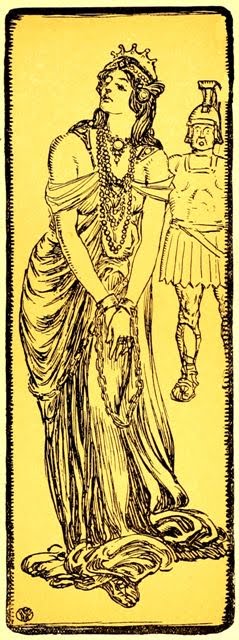
Zenobia was empress of the people of Palmyra;
She tried to boss the army when she should have stayed at home.
Aurelian, the soldier, led a sort of a hegira
Of armies up to fight her—they came all the way from Rome.
Full soon he was pursuing them, with spears and daggers “shooing” them,
At last he sent them to defeat and caught the doughty queen.
He captured her regretfully, he said, but she said fretfully
That she considered him a spiteful thing, and very, very “mean.”
He led her back a captive with her hands in jeweled fetters,
Though she cast on Aurelian a look of proud disdain;
Her manacles were carved and chased and decked by jewel setters,
And to securely hold her he had made a golden chain.
There is a lot of mystery connected with all history—
Zenobia, they tell us, didn’t want to go to jail,
But, think of such a fate as that! Why, such a jeweled weight as that
Was better than to pawn your clothes and be released on bail!
Zenobia was taken to the royal Roman palace
And there the charming prisoner, we read, was quite the rage—
Had she lived in this time of ours (we say this without malice),
She might have made a lasting hit by going on the stage.
Aurelian was nice to her—he hinted more than twice to her
That he was getting pretty tired of kinging it alone.
You see, she might have captured him—already she enraptured him—
And had that handcuff jewelry to wear upon the throne.
But, no! Zenobia was like ‘most any other lady—
They’ve been the same since mother Eve; they have the same way still:
No matter if it’s Princess May, or Susie, Sal or Sadie,
No lady will consent to be convinced against her will.
At last they told her civilly, “You’ll have to live in Tivoli”
(Which may or may not be the way to speak that city’s name).
She answered very prettily: “I’ll love to live in Italy”—
And there she stayed until she was an old, forgotten dame.